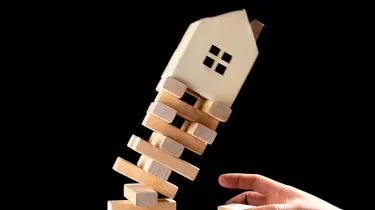Invest
Will the property market finally crash?
Australian home prices are likely to fall by 10 to 15 per cent by 2024, an expert said.
Will the property market finally crash?
Australian home prices are likely to fall by 10 to 15 per cent by 2024, an expert said.

Poor affordability and rising interest rates are expected to drive home prices lower by 10 to 15 per cent into 2024, AMP’s Shane Oliver said in his latest episode of Oliver’s Insights.
According to Dr Oliver, national average property prices are likely to peak around midyear and then enter a cyclical downswing.
“After 22 per cent growth in national average home prices last year, average home price growth this year is expected to be around 1 per cent and we expect a 5 to 10 per cent decline in average prices in 2023,” Dr Oliver said.
“Top to bottom the fall in prices into 2024 is likely to be around 10 to 15 per cent, which would take average prices back to the levels of March/April last year,” he continued.

The existing divergence between capitals is, however, expected to remain.
“Sydney and Melbourne look like they have already peaked and are likely to see falls at the high end of the range. But Brisbane, Adelaide, Perth and Darwin and regional areas are less constrained by poor affordability and are likely to see shallower falls,” Dr Oliver said.
As for the main drivers of the current downswing, Dr Oliver believes it will be a combination of poor affordability, rising fixed mortgage rates, impending RBA hikes, high inflation, and a decline in home buyer confidence. Higher supply in Sydney and Melbourne as a result of vendors seeking to take advantage of high prices and solid construction after two years of zero immigration are also likely to play a part.
“Over the last 25 years average capital city dwelling prices rose 358 per cent compared to a 113 per cent rise in wages. So prices rose more than three times that of wages. From their most recent low in September 2020, prices have gone up 20 per cent versus just a 3.7 per cent rise in wages. This has priced more home buyers out of the market,” Dr Oliver explained.
He foresees an RBA rate hike in June, with variable mortgage rates expected to lift by nearly 1 per cent by year end and by 1.5 per cent by mid next year.
“Rough estimates suggest that a 1.5 per cent to 2 per cent rise in mortgage rates would reduce home buyer borrowing power and the ability to pay for a house by 10 to 15 per cent,” Dr Oliver predicted.
Recent RBA modelling suggested that a 2 per cent rise in interest rates would lower real house prices by around 15 per cent over a two-year period.
Will prices crash?
According to Dr Oliver, no, but only because he deems a 'crash' to be a fall of 25 per cent or so.
“Our assessment is that while a crash is possible, it is unlikely unless we see very aggressive rate hikes – say taking the cash rate to 4 or 5 per cent - or much higher unemployment, driving a sharp rise in defaults and forced property sales,” he explained.
But Dr Oliver does believe that Australia could be nearing the end of its 25-year home price boom.
He explained while the unfolding property downswing could be just another cyclical downswing, the “25-year bull market is likely to come under pressure in the years ahead”.
Looking towards the May federal election, Dr Oliver predicted that a change in government wouldn’t impact the outlook due to the relatively minor policy differences with respect to property between Labor and the Coalition.
“Out of interest, using CoreLogic data since 1980 capital city property prices have risen 6.6 per cent pa under Coalition governments and 5.2 per cent pa under Labor. But the dominant influence has been the economic cycle and interest rates, as policies with respect to housing have not been particularly different.”
About the author

About the author


Property
Multigenerational living is moving mainstream: how agents, developers and lenders can monetise the shift
Australia’s quiet housing revolution is no longer a niche lifestyle choice; it’s a structural shift in demand that will reward property businesses prepared to redesign product, pricing and ...Read more

Property
Prestige property, precision choice: a case study in selecting the right agent when millions are at stake
In Australia’s top-tier housing market, the wrong agent choice can quietly erase six figures from a sale. Privacy protocols, discreet buyer networks and data-savvy marketing have become the new ...Read more

Property
From ‘ugly’ to alpha: Turning outdated Australian homes into high‑yield assets
In a tight listings market, outdated properties aren’t dead weight—they’re mispriced optionality. Agencies and vendors that industrialise light‑touch refurbishment, behavioural marketing and ...Read more

Property
The 2026 Investor Playbook: Rental Tailwinds, City Divergence and the Tech-Led Operations Advantage
Rental income looks set to do the heavy lifting for investors in 2026, but not every capital city will move in lockstep. Industry veteran John McGrath tips a stronger rental year and a Melbourne ...Read more

Property
Prestige property, precision choice: Data, discretion and regulation now decide million‑dollar outcomes
In Australia’s prestige housing market, the selling agent is no longer a mere intermediary but a strategic supplier whose choices can shift outcomes by seven figures. The differentiators are no longer ...Read more

Property
The new battleground in housing: how first-home buyer policy is reshaping Australia’s entry-level market
Government-backed guarantees and stamp duty concessions have pushed fresh demand into the bottom of Australia’s price ladder, lifting values and compressing selling times in entry-level segmentsRead more

Property
Property 2026: Why measured moves will beat the market
In 2026, Australian property success will be won by investors who privilege resilience over velocity. The market is fragmenting by suburb and asset type, financing conditions remain tight, and ...Read more

Property
Entry-level property is winning: How first home buyer programs are reshaping demand, pricing power and strategy
Lower-priced homes are appreciating faster as government support channels demand into the entry tier. For developers, lenders and marketers, this is not a blip—it’s a structural reweighting of demand ...Read more

Property
Multigenerational living is moving mainstream: how agents, developers and lenders can monetise the shift
Australia’s quiet housing revolution is no longer a niche lifestyle choice; it’s a structural shift in demand that will reward property businesses prepared to redesign product, pricing and ...Read more

Property
Prestige property, precision choice: a case study in selecting the right agent when millions are at stake
In Australia’s top-tier housing market, the wrong agent choice can quietly erase six figures from a sale. Privacy protocols, discreet buyer networks and data-savvy marketing have become the new ...Read more

Property
From ‘ugly’ to alpha: Turning outdated Australian homes into high‑yield assets
In a tight listings market, outdated properties aren’t dead weight—they’re mispriced optionality. Agencies and vendors that industrialise light‑touch refurbishment, behavioural marketing and ...Read more

Property
The 2026 Investor Playbook: Rental Tailwinds, City Divergence and the Tech-Led Operations Advantage
Rental income looks set to do the heavy lifting for investors in 2026, but not every capital city will move in lockstep. Industry veteran John McGrath tips a stronger rental year and a Melbourne ...Read more

Property
Prestige property, precision choice: Data, discretion and regulation now decide million‑dollar outcomes
In Australia’s prestige housing market, the selling agent is no longer a mere intermediary but a strategic supplier whose choices can shift outcomes by seven figures. The differentiators are no longer ...Read more

Property
The new battleground in housing: how first-home buyer policy is reshaping Australia’s entry-level market
Government-backed guarantees and stamp duty concessions have pushed fresh demand into the bottom of Australia’s price ladder, lifting values and compressing selling times in entry-level segmentsRead more

Property
Property 2026: Why measured moves will beat the market
In 2026, Australian property success will be won by investors who privilege resilience over velocity. The market is fragmenting by suburb and asset type, financing conditions remain tight, and ...Read more

Property
Entry-level property is winning: How first home buyer programs are reshaping demand, pricing power and strategy
Lower-priced homes are appreciating faster as government support channels demand into the entry tier. For developers, lenders and marketers, this is not a blip—it’s a structural reweighting of demand ...Read more








